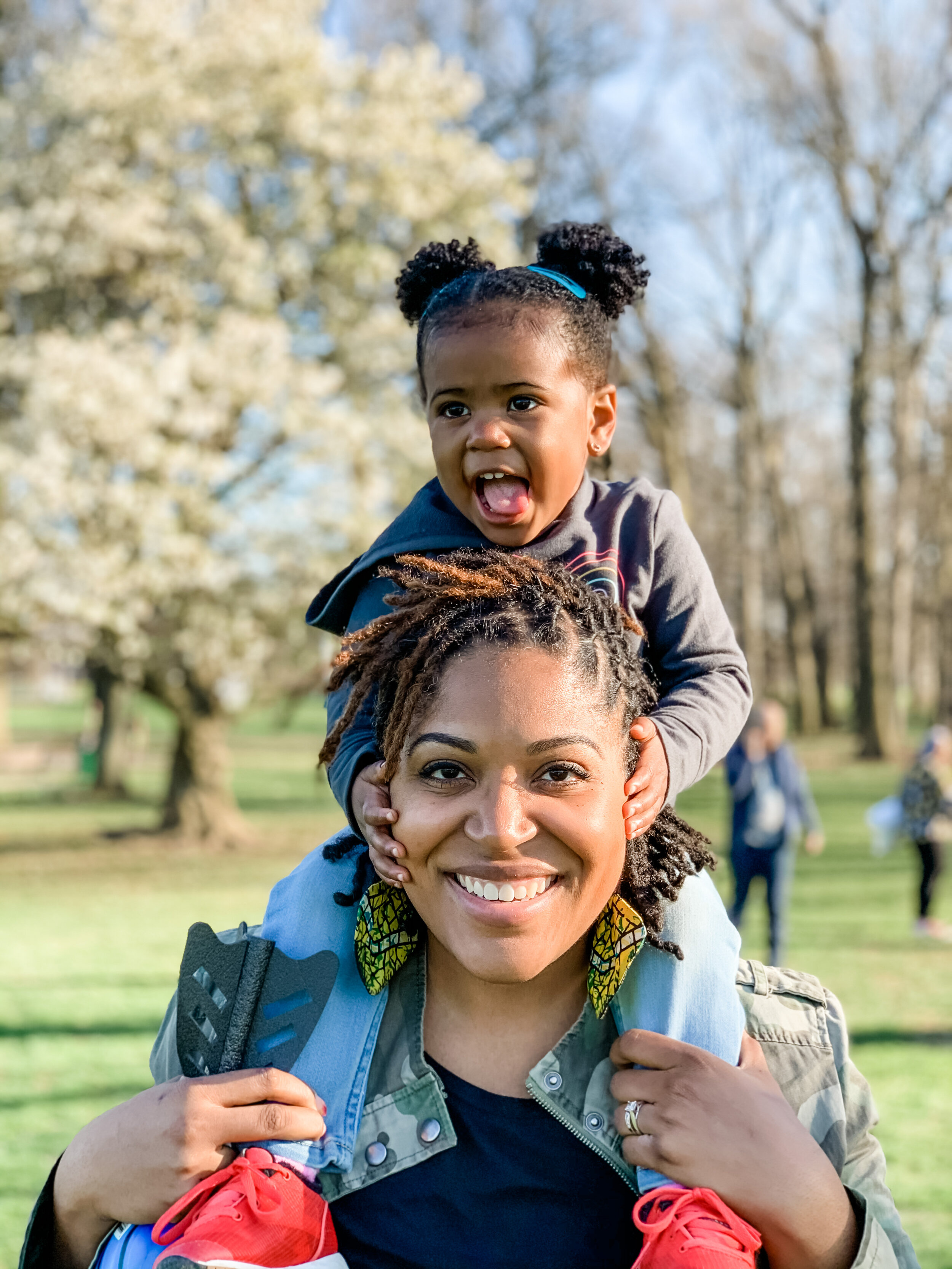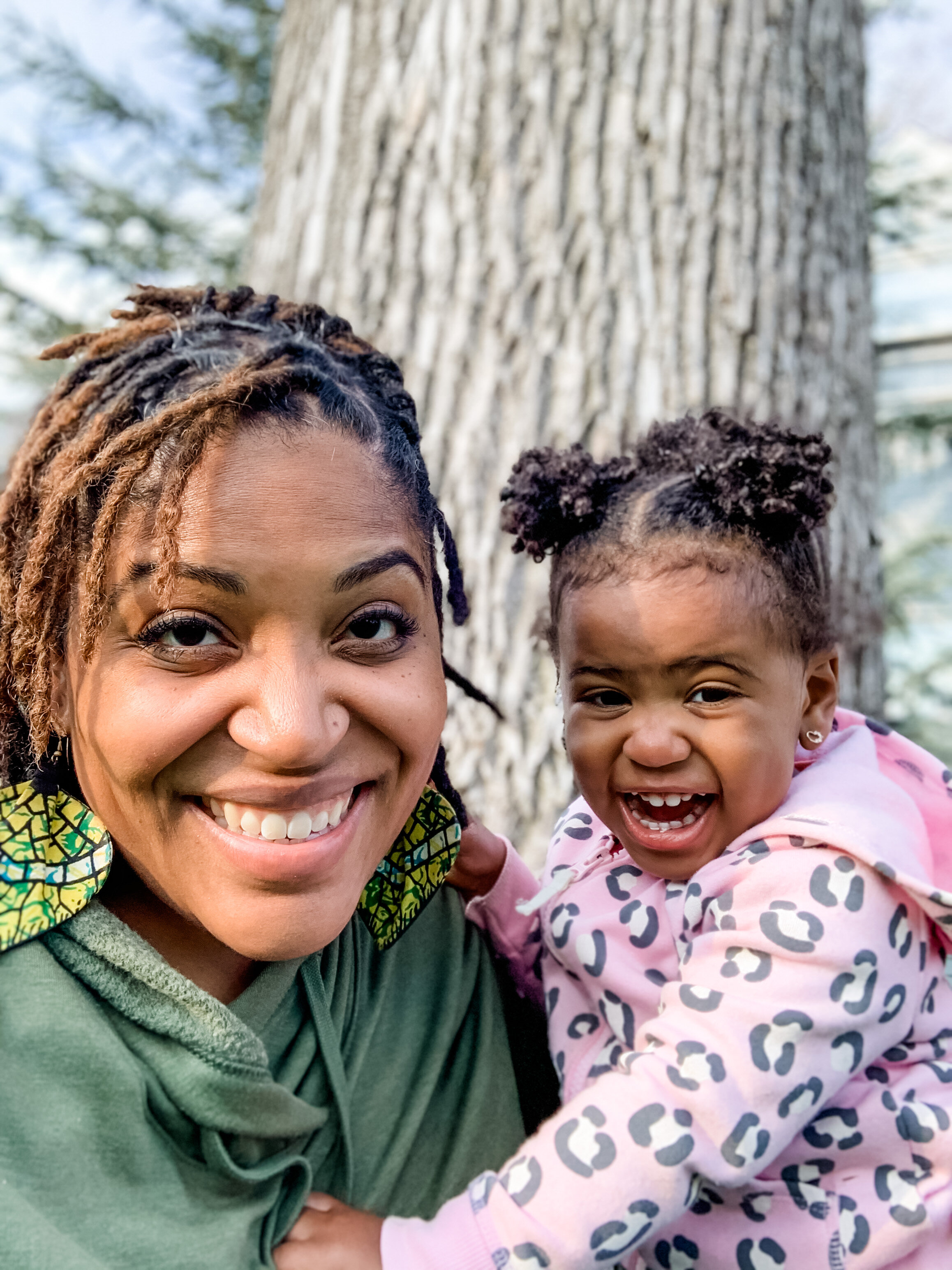As I entered motherhood as a black woman, there were a number of stereotypes that fill the space of who I’m supposed to be, and how I’m supposed to act, in order to continue this legacy of black motherhood.
Black moms are strong, they don’t play, they don’t have time, they are too stressed, you will not try them, they will give you something to cry for, and will only tell you one more time. A black mom who has a child who steps out of line or doesn’t jump back in line, at the tilt of her neck, or the cut of her eyes, is not parenting in the “black tradition.” She’s trying some “other shit” but will learn eventually that all her child needs, is a good butt whooping to get her child to “act right”. I’m of course speaking in general terms about the perception of black mothers. But it is a perception grounded in reality. It feels like parenting in any other way is actually counter-cultural.
I was not raised by that black mother, but was around enough of them, that I knew things were different for me. Mostly, I was grateful that I didn’t get popped in my mouth for talking back as a pre-teen, battling for my independence, but there was a part of me that felt like I was getting away with something, because my mom was “soft”. She wasn’t the authoritarian mom I saw threatening my peers with physical violence for every infraction. Based on what surrounded me, I assumed then, that I probably deserved to get hit, but was just fortunate enough to be born into a home that wasn’t into that. I also entered motherhood without having made a final decision about whether or not I’d physically discipline my child. In my mind, it was going to be based on their personality. Some kids deserve or need to be hit, right? Some kids will respond to beatings—Other kids will respond to lectures. I assumed it would be a personality based decision. That was an opinion solely based on what I’d heard, not based on a single piece of evidence, research or fact.
As I read and learn more about gentle, conscious parenting, I am grateful to my mom, whom I can only assume was just following her instincts as a mother who loved her child, because parenting books weren’t really a thing. She made me feel like my opinions mattered and allowed me to follow my passions. She did intentionally, along with my father, decide to end a cycle of violent physical discipline that they had both experienced growing up. To be clear, I put ALL physical discipline in the same category. Beating, whupping, spanking, plucking, it’s all the same. Clearly, each can result in a different level of physical pain to the child, but what remains the same, is that as a discipline technique, the purpose is to inflict pain or fear as a means of altering a child’s behavior. This is not something that most people believe is appropriate for any other vulnerable or weaker population. Hitting the mentally disabled, the elderly, a woman or even animals is seen as intolerable cruelty. No one would attempt to justify the “type” of hit. No one would say, “I spanked my grandmother but I explained why afterward.” Or “I popped my girlfriend, but I did it with love”. These statements are fully unacceptable for any population except for our children. Why is that? Why are our children relegated to such a low social standing in our culture?
I admittedly, have grown into a person that is ok with being the odd woman out. I think it is my absolute right to question, scrutinize, and analyze absolutely everything and everyone that impacts my life directly or indirectly. There is not a single conscious decision that I make that is purely because that’s how it’s always been done, or because that’s how everyone else does it. I think tradition is overrated and independent thought under-utilized in this world. And after reading the increased risk factors and the impact on brain development associated with any sort of physical discipline, my decision was a no-brainer. F@ck tradition, f$ck opinions. I’m working with facts now.
With that said, I have no intention of upholding this legacy of black motherhood that was born out of colonization, slavery, fear and tradition. I am taking the time to share my journey to conscious parenting for those who want to parent differently, but don’t know where to begin. I also want to create a space for moms who feel like they are alone in not wanting to follow the status quo. There are plenty of spaces on social media for people to post their tough parenting “techniques”. --Spaces where humiliation, shouting, and beatings are applauded and reinforced as good parenting, because the notion is that these tactics will most certainly result in well-mannered or well-behaved kids. As a people who largely believe in beatings, can we honestly look at our standing in this country, or this world, and say that our parenting practices are leading to any sort of widespread success?
Here are some of my favorite passages from Stacy Patton’s book, “Spare the Kids”.
“… black folks continue to loudly and proudly describe the pain of their own childhood whuppings as a sign of strength, a source of humor, and essential to shaping them into the successful people they are today… Truth be told, if whupping black children were a prerequisite for white recognition of our humanity and civil rights, and for good black citizenship and success, then black Americans ought to be ruling this country right now. Parenting based on beatings has not led our people to the Promise Land.”
“Sadly, hitting children who can’t protect themselves has become part of our cultural DNA and identity. For many black parents, not spanking is viewed as selling out or acting white. We mock parents who use “time-outs,” who take away phones and iPads as punishment, and who employ verbal reasoning with children. We scoff at their privilege and how nice it must be to have the luxury to ignore the misdoings of your children in public spaces. Only those with privilege have the time to read parenting blogs and books about positive discipline. Only those who don’t have to worry about being seen as another bad black parent can think that no TV time for little Connor and Becky will lead to them knowing how to act right in the world. This kind of racialized mockery has become part of how we rationalize hurting black children’s bodies.”
“The embrace of whuppings isn’t only about affirming our blackness, like celebrating Kwanzaa and knowing the words to the Black National Anthem. The decision “whether to physically discipline our children is seen as one of life or death. Embracing alternative parenting styles is viewed as risky, one that might lead to unruly children who don’t “know how to act,” or worse, invite the violence of American racism. Meanwhile, as increasing numbers of white folks continue to explore nonviolent methods of child-rearing, black folks have convinced ourselves that we must whup our children because if we don’t then the police will beat them, lock them up, or kill them. Well, how is that parenting strategy working for us?”
This book goes in! I hope to revisit it from time to time on this blog because there are sooo many topics worthy of discussion.
Shefali Tsabary says in The Conscious Parent, “Many of us don’t see a reason to question our own ideas because we assume that we are right and have nothing to rethink.” She says that we have an “unexamined worldview”. After a couple of posts about rethinking the necessity of physical discipline on my instagram page, it is clear that there are many people who choose not to question their world or world experiences at all. This blog is not for them. It’s for those of you who feel like the most important role you’ll ever play as parent, is worthy of examination. It’s for those of you who desire to parent from a place of knowledge and reflection, not tradition. We have this thing in our community, “But that’s your mom”. Because of this unwavering loyalty to our moms, we often feel like we can’t question any of their decisions or actions. They are beyond reproach. And even when we know that some of their choices were not the best, even traumatizing in some instances, we don’t dare scrutinize or criticize those choices or practices because… that’s your mom. Without examination or acknowledgement of damaging parenting practices, we will inevitably repeat them with our own children, repeating an unexamined tradition of parenting. You can love your mom with all of your heart and soul and simultaneously acknowledge that her parenting style may not be one that you want to replicate.
The question that is often asked is, “What do you do instead of hitting them?”. The reason why there is no set answer to this question is because more often than not, the reasons adults think a child needs a beating is because they completely lack any understanding of developmentally appropriate behaviors. I can’t imagine the number of spankings that would be avoided in the black community if more of us knew the long list of behaviors that are annoying, or appear to be indications that our kids are “bad”, but are actually signs of healthy and normal brain development, and depending on the child’s age, completely out of their control. I will talk about these uncontrollable urges called “schemas” in another blog post. So if you view every misbehavior as an affront or challenge to your authority, then you will see the need for a consequence for every infraction. If you make the effort to learn about child development, what will happen is that you’re going to find that there are less and less times that you’ll feel like your child deserves to be punished in any way physical or otherwise. I look forward to sharing the number of “aha moments’ I’ve had about my daughter’s behavior by simply delaying my response and just waiting and observing. Countless times this has led to me gaining understanding about what was driving the behavior. And at least from the perspective of toddler logic and development, the action or behavior actually made sense. In those instances I can then address the cause as opposed to the behavior.
As a society, it’s hard for us to wrap our minds around that fact that punishment doesn’t actually change behavior. But if you take a moment to examine it, it will be obvious. Have you ever watched Michael K Williams show “Black Market”? He travels the world and interviews “criminals”. In every single instance, the criminal behavior is born out of poverty and desperation. However, if caught we will punish the crime but not address the underlying poverty that led to criminal behavior. This is why our recidivism rate is higher than any other place in the world. The penalty of prison does not stop the criminal behavior.
Have you ever received a speeding ticket? Did you travel the speed limit every time afterward, or did you just become better at remembering all the spots where the cops and speed cameras are located? Did the penalty change your behavior or make you more adept at avoiding the consequence? I’d argue that the penalty just makes you sneaky. It makes you view the cop or the camera as an opponent.—An authority figure to be feared, or outsmarted and/or avoided. Is that the relationship you want with your child? What would it take to get you to stop speeding? The answer isn’t simple and would be different for everyone. It would take some creative thinking on the part of police to figure out what would get you, dear reader, to stop speeding. It would be impossible for our government to take the time to figure out what would work for every citizen in the country. So instead, we impose penalties. A one-size fits all, ineffective approach, that does nothing but cause people to put on their breaks when they see a cop car on the highway.
Fortunately, you are not responsible for figuring out the needs of an entire city or country. But if you want to parent in an “untraditional” way, you will have to invest that time and energy into the people you chose to bring into this world. You will have to honor their individual spirits and see that discipline is a word that can only have any meaning if the parent has the self-discipline to model the behaviors they want their children to embody. You will have to release the notion that the relationship with your child has to be one of master and servant— relying on blind obedience to your authority. You will have to change— your thoughts, your actions, your reactions in order to effect change on any other person— even a child, especially your child.
Tsabary says, “The relationship between parent and child exists for the primary purpose for the parent’s transformation.— And secondary for the raising of the child.” I am committed to my own transformation to be the mother my daughter deserves. I’m excited to share that journey and hopefully share resources and ideas that will help you with your own.





